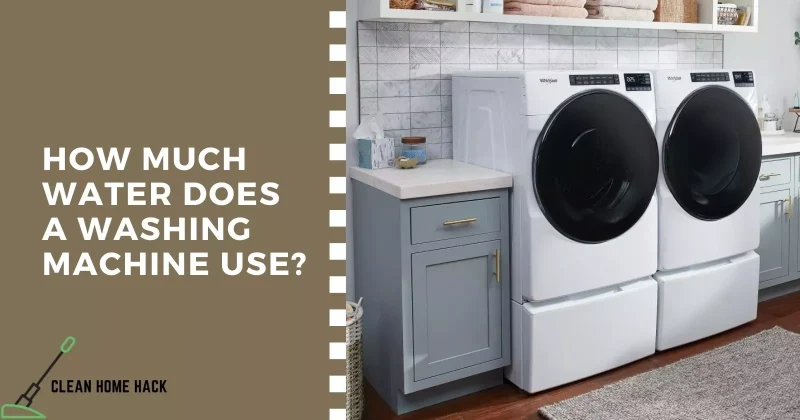How Much Water Does a Washing Machine Use? [5 Factors Affecting Usage]

 The Short Answer is: The Short Answer is: |
| A washing machine's water usage can vary based on factors such as the machine's age, type, and load size. On average, an ENERGY STAR certified washer uses 15 gallons of water per load, while a standard washing machine uses 20 gallons per load. Older washing machine models can use significantly more water, with some using 40-45 gallons per load. The water usage also depends on the cycle, settings, and load size. |
Do you ever wonder how much water your washing machine uses? Well, as the saying goes, ‘You can’t have your cake and eat it too.’ It’s important to understand the water usage of your washing machine so that you can make informed decisions about your laundry routine.
In this article, we will explore the average water usage of washing machines, factors that affect usage, and tips to reduce water consumption. We will also discuss the impact of washing machine water usage on the environment and your bills.
So, let’s dive in and explore the topic, “How Much Water Does a Washing Machine Use”
Table of Contents
Average Usage
On average, your washing machine uses approximately 15-30 gallons of water per load. However, this usage can vary depending on several factors affecting efficiency and the implementation of water conservation techniques.
With the increasing impact of water scarcity, it’s essential to explore alternative washing methods and integrate water-saving technologies into our daily routines.
Factors Affecting Usage
When it comes to the factors that affect water usage in a washing machine, there are several factors to consider.
1. Age of Washer
If you have an older washing machine, it will likely use more water than newer models. This is because older washers lack the energy efficiency and water-saving technology found in modern machines.
With advancements in technology, manufacturers have developed washing machines that are designed to conserve water and reduce water consumption.
These newer models are equipped with features such as load sensors, which adjust the water levels based on the size of the load, and high-efficiency wash cycles that use less water overall.
By using a newer washing machine with water-saving technology, you can contribute to water conservation efforts and reduce your water consumption.
Additionally, it’s worth noting that the lifespan of a washing machine is typically around 10-13 years, so if your machine is approaching that age, it may be a good time to consider upgrading to a more efficient model.
2. Capacity
To determine the factors affecting usage, consider the number of loads you typically wash in a week. Load capacity plays a significant role in determining water consumption.
If you have a larger load capacity, you can wash more clothes in a single cycle, thereby reducing the number of loads and saving water. Additionally, larger load capacities tend to be more energy efficient, as they require fewer cycles to complete the same amount of laundry.
In order to further reduce water consumption, you can also implement water-saving techniques, such as using eco-friendly options like low-water wash cycles or choosing a washing machine with a water conservation feature.
3. Load Size
Load size plays a significant role in water consumption. Washing larger loads requires more water to properly clean the clothes, resulting in higher water usage.
If you’re concerned about water conservation and want to save on your water bill, there are several water-saving techniques you can adopt. For instance, you can try to maximize the capacity of each load by filling the machine to its recommended level.
Additionally, using water-efficient options, such as selecting the appropriate cycle for the load size, can also help reduce water consumption.
By being mindful of load size and implementing water-saving techniques, you can make your washing machine more environmentally friendly and save on water usage.
4. What is being Washed
When washing different types of items, the water usage of your washing machine can vary. The types of fabrics being washed play a significant role in determining water usage.
Certain fabrics may require more water to effectively clean, while others may need less. Stain levels also affect the amount of water needed. Heavily stained items may require more water for thorough cleaning.
The water temperature selected for the wash cycle also impacts water usage. Hot water typically requires more water than cold or warm water.
Additionally, the washing machine settings chosen can affect water consumption. Using a higher water level or longer wash cycle may result in increased water usage.
Lastly, implementing water conservation measures, such as using the appropriate load size and selecting eco-friendly settings, can help reduce water usage.
5. Rinse Setting
One important factor that affects the water usage during the rinse setting of your washing machine is the number of rinse cycles selected. The more rinse cycles you choose, the more water your machine will consume.
To save water during the rinse cycle, you can try implementing water-saving techniques such as using a lower water level or using a shorter rinse cycle. Water conservation is crucial in reducing our environmental impact, and by being mindful of our water consumption, we can contribute to this effort.
It’s also helpful to compare your washing machine’s water usage to other models or brands to see if there are any water usage trends that you can take advantage of.
How Much Water Does A Top Loader Washing Machine Use
Washing machine water usage depends on several factors, including the type of washing machine. A standard top-loading washing machine with an agitator uses 19 gallons of water per load, while a high-efficiency top-loading washing machine uses 12 to 17 gallons of water per load.
Older, non-HE top-load washer models typically use about 40 gallons of water per load because they soak laundry the entire wash cycle while an agitator carries it.
How Much Water Does A Front-Loading Washer Use
Front-loading washers are known for their water efficiency. On average, a high-efficiency front-load washing machine uses about 7 gallons of water per load, while older, non-HE top-load washer models can use up to 40 gallons of water per load.
The water efficiency of front-load washers is achieved through factors such as load size auto-sensors, reduced water dilution with specially formulated detergent, and increased friction between fabrics for optimal cleaning. These washers are designed to use less water while still cleaning clothes effectively.
Tips to Reduce Usage
To reduce water usage when using a washing machine, consider implementing these five simple tips.
First, utilize conservation methods such as adjusting the water level according to the size of the load. This ensures that you only use the necessary amount of water for each cycle.
Second, practice water-saving techniques like using the shortest wash cycle possible. This not only reduces water consumption but also saves energy.
Third, adopt efficient laundry practices by waiting until you have a full load before running the machine. This maximizes the use of water and energy per load.
Fourth, develop eco-friendly washing habits such as pre-treating stains instead of rewashing the entire garment. By targeting specific areas, you can avoid unnecessary water wastage.
Finally, consider investing in a high-efficiency washing machine. These appliances are designed to use less water and energy while still delivering excellent cleaning results.
Water Efficiency Labels and Ratings
To understand the water efficiency of a washing machine, you should look for water efficiency labels and ratings. These labels and ratings provide valuable information about the amount of water a washing machine uses and its overall efficiency.
When shopping for a new washing machine, it’s important to consider water-saving technologies and look for appliances with high water efficiency ratings. By choosing a water-efficient washing machine, you can contribute to water conservation efforts and reduce your water usage.
Water efficiency labels and ratings allow you to compare different models and make an informed decision about which one is best for your needs.
These labels often include information about the gallons of water used per cycle and the energy efficiency of the machine. Additionally, they may provide water-saving tips and recommendations for optimal usage.
By investing in water-efficient appliances, you can significantly reduce your water consumption and contribute to a more sustainable future. Not only will this save you money on your water bills, but it will also help preserve this precious resource for future generations.
Impact of Washing Machine Water Usage on the Environment and Bills
When it comes to the impact of washing machine water usage on the environment and your bills, it’s important to understand the consequences of excessive water consumption.
The environmental impact of using excessive amounts of water for laundry is significant. Water is a precious resource, and excessive usage can lead to water scarcity and strain on local ecosystems.
By conserving water, you can help protect the environment and promote sustainable living. Additionally, excessive water usage can also have a negative impact on your monthly utility bills.
Using more water means higher water bills, and in turn, higher energy bills if you have a water heater. By using your washing machine efficiently and conserving water, you can save money on your bills and reduce your overall household expenses.
To minimize the impact on the environment and maximize cost savings, it’s important to choose a washing machine that’s water and energy-efficient. Look for models that have high water conservation ratings and energy-saving features.
These machines use less water and energy per load, which not only reduces your environmental footprint but also saves you money in the long run.
Frequently Asked Questions Related to Washing Machine Water Usage:
How much water does a washing machine use per load?
The amount of water a washing machine uses per load can vary depending on factors such as the size of the machine, the load size, and the cycle selected.
On average, top-loading washing machines typically use around 15 to 30 gallons (56 to 113 liters) of water per load. Front-loading machines are generally more water-efficient and can use as little as 10 to 20 gallons (38 to 76 liters) per load.
However, it’s important to note that newer models of washing machines often have water-saving features that can further reduce water consumption.
How much water does a high-efficiency washing machine use?
A high-efficiency washing machine typically uses less water compared to traditional top-loading machines. On average, these machines can use around 15-30 gallons of water per load, depending on the model and settings used.
Reduced water consumption is achieved through various advanced technologies, such as sensors that determine the optimal water level based on the load size and fabric type.
This not only helps conserve water but also reduces energy usage, as less water needs to be heated. Overall, high-efficiency washing machines offer a more eco-friendly and cost-effective option for laundry.
How much water does a 7kg washing machine use?
A 7kg washing machine typically uses around 50-60 liters of water per wash cycle. The exact amount may vary depending on the specific model and settings chosen.
It is important to note that newer washing machines often come with water-saving features and adjustable water levels, allowing for more efficient use of water.
How many gallons of water does a washing machine use?
The amount of water used by a washing machine can vary depending on the model and settings. On average, top-loading washing machines use about 20-30 gallons of water per load, while front-loading machines use around 10-15 gallons.
However, newer models are designed to be more water-efficient, using as little as 7-10 gallons per load. It’s important to note that water usage can also be influenced by the load size and the selected cycle.
Some machines offer options to adjust water levels, allowing users to customize water usage based on their needs.
How much water does a washing machine hold?
The amount of water a washing machine can hold varies depending on the size and model of the machine. Generally, top-loading washing machines have a capacity ranging from 2.5 to 3.5 cubic feet, which translates to approximately 15 to 20 gallons of water.
Front-loading washing machines typically have a larger capacity, ranging from 3.5 to 5 cubic feet, or about 20 to 30 gallons of water. It’s important to note that these are average capacities, and specific models may have slightly different water-holding capacities.
Conclusion on How Much Water Does a Washing Machine Use
To minimize both your environmental impact and household expenses, choose a water and energy-efficient washing machine that uses less water and energy per load.
When it comes to determining the average water usage of a washing machine, there are several factors that come into play. One of the main factors is the age of the washer. Older models tend to use more water compared to newer, more efficient ones.
The capacity of the washing machine is another important factor. Machines with larger capacities generally use more water to accommodate the larger load size. It’s also worth noting that the size of the load being washed can affect water usage. Smaller loads will require less water compared to larger ones.
By considering these factors and choosing a washing machine with a smaller capacity and newer technology, you can significantly reduce your water consumption.







Usually I do not learn article on blogs, however I would like to
say that this write-up very compelled me to try and
do so! Your writing style has been surprised me.
Thanks, quite great article.
Dear Cassie Mehler,
Thank you so much for your kind words! I’m thrilled to hear that you enjoyed the article and that it has inspired you to give blog reading a try. Your feedback means a lot to me, and I’m delighted that you found the writing style surprising and engaging.
If you have any questions or topics you’d like to see covered in future articles, feel free to let me know. I’m here to help and to continue providing great content that resonates with you.
Thanks again for your support and for taking the time to leave such a lovely comment!
Best regards,